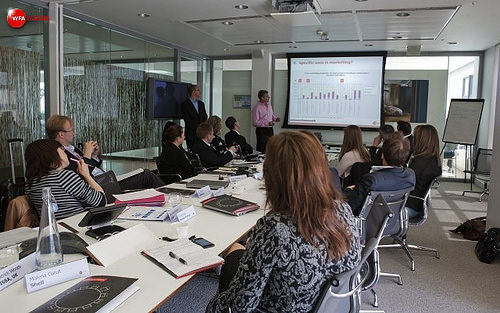WFA CMOFORUM meets in Cannes
30/06/2014
Back to the overview
On 18th June 2014, an array of big name CMOs gathered at the Cannes Lions to take part in the latest WFA CMOForum to share and discuss topics ranging from marketing capabilities to innovation.
Guest presentations from EffectiveBrands – now Millward Brown Vermeer – and BrainJuicer helped stimulate discussion around the need for marketers need to change and adapt.
Key take-outs from the meeting, which involved 27 CMOs or equivalent from WFA member companies, including Carlsberg, Daimler, Danone, Grupo Bimbo, Mars, Mercedes-Benz, Pernod Ricard, Nissan, Red Bull, Turkcell and Unilever were:
1. Short-term collaboration delivers results. Cross-discipline collaboration, for example marketing and IT working together is becoming increasingly important and many companies are seeking to bring their talent together in multi-disciplinary project teams. Whilst these teams have a limited life-span – one member suggested 6-7 months – the focus and collaboration can prove to be extremely effective.
2. Capability programmes need flexibility for millennials. Internal programmes need to recognise that tomorrow's leaders will expect the relevant content at a time and in a format which suits them. This means developing on-demand training on platforms they are used to using in their everyday lives. Companies have to give them what they want, when they want it.
3. More specialists, fewer generalists. Marketing needs more specialists be they data analysts, scientists or artists but accommodating them requires more flexible corporate structures. One member suggested the creation of internal talent pools, with specialist resources accessed as and when needed.
4. Create a start-up frame of mind. Internalising key roles and hiring talent from digital start-ups can help a large multinational compete more effectively with smaller, more nimble, competitors. It may need to happen on the fringes of the company at first, for example in innovation labs, but ultimately such roles should be proven to, and backed by, the board.
5. The welcome return of marketing instinct. Many felt that gut-feel is increasingly returning to marketing. Arguably the framework needs to move from think > feel > do to feel > do > think. More famous, game-changing, work comes from applying more emotion to marketing than from a more rational approach.
The CMOForum wrapped up with a strong show of support for the WFA's Project Reconnnect, which is designed to reconnect marketing with consumers to set rules for communications in the digital age. Spearheaded by Unilever's SVP Marketing, Marc Mathieu, WFA invited CMOFORUM members to join an informal advisory board which would steer the next steps of the project. Sixteen CMOs from the meeting agreed to join the advisory committee.
For more information about Project Reconnect, contact Will or follow @WFAReconnect
Sign up to monthly WFA news
Guest presentations from EffectiveBrands – now Millward Brown Vermeer – and BrainJuicer helped stimulate discussion around the need for marketers need to change and adapt.
Key take-outs from the meeting, which involved 27 CMOs or equivalent from WFA member companies, including Carlsberg, Daimler, Danone, Grupo Bimbo, Mars, Mercedes-Benz, Pernod Ricard, Nissan, Red Bull, Turkcell and Unilever were:
1. Short-term collaboration delivers results. Cross-discipline collaboration, for example marketing and IT working together is becoming increasingly important and many companies are seeking to bring their talent together in multi-disciplinary project teams. Whilst these teams have a limited life-span – one member suggested 6-7 months – the focus and collaboration can prove to be extremely effective.
2. Capability programmes need flexibility for millennials. Internal programmes need to recognise that tomorrow's leaders will expect the relevant content at a time and in a format which suits them. This means developing on-demand training on platforms they are used to using in their everyday lives. Companies have to give them what they want, when they want it.
3. More specialists, fewer generalists. Marketing needs more specialists be they data analysts, scientists or artists but accommodating them requires more flexible corporate structures. One member suggested the creation of internal talent pools, with specialist resources accessed as and when needed.
4. Create a start-up frame of mind. Internalising key roles and hiring talent from digital start-ups can help a large multinational compete more effectively with smaller, more nimble, competitors. It may need to happen on the fringes of the company at first, for example in innovation labs, but ultimately such roles should be proven to, and backed by, the board.
5. The welcome return of marketing instinct. Many felt that gut-feel is increasingly returning to marketing. Arguably the framework needs to move from think > feel > do to feel > do > think. More famous, game-changing, work comes from applying more emotion to marketing than from a more rational approach.
The CMOForum wrapped up with a strong show of support for the WFA's Project Reconnnect, which is designed to reconnect marketing with consumers to set rules for communications in the digital age. Spearheaded by Unilever's SVP Marketing, Marc Mathieu, WFA invited CMOFORUM members to join an informal advisory board which would steer the next steps of the project. Sixteen CMOs from the meeting agreed to join the advisory committee.
For more information about Project Reconnect, contact Will or follow @WFAReconnect
Sign up to monthly WFA news
















































































